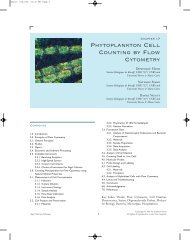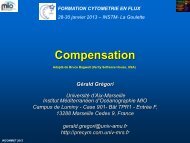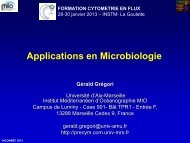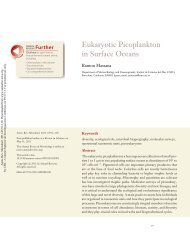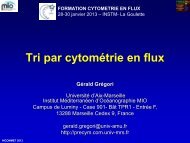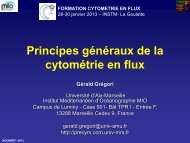Toxic Phytoplankton in aquaculture production area - incommet
Toxic Phytoplankton in aquaculture production area - incommet
Toxic Phytoplankton in aquaculture production area - incommet
You also want an ePaper? Increase the reach of your titles
YUMPU automatically turns print PDFs into web optimized ePapers that Google loves.
INCOMMET<br />
Improv<strong>in</strong>g National Capacities <strong>in</strong> Observation and<br />
Management of Mar<strong>in</strong>e Environment <strong>in</strong> Tunisia<br />
(FP7-INCO-2011-6, ERA-WIDE)<br />
“<strong>Toxic</strong> <strong>Phytoplankton</strong> <strong>in</strong> <strong>aquaculture</strong> <strong>production</strong> <strong>area</strong>:<br />
Diversity, Taxonomy, Methods of <strong>in</strong>vestigation”<br />
24-28 Septembre 2012 – INSTM Sfax<br />
Objective<br />
One of the objectives of the INCOMMET project (Support Action, Capacities program,<br />
Era-Wide) is to improve INSTM scientific and technological capacities through tw<strong>in</strong><strong>in</strong>g<br />
activities. Two tra<strong>in</strong><strong>in</strong>g session focus<strong>in</strong>g on toxic phytoplankton will be held dur<strong>in</strong>g the<br />
project.<br />
This tra<strong>in</strong><strong>in</strong>g will consist on the identification of cell morphology of toxic<br />
phytoplankton that can affect shellfish farm and <strong>aquaculture</strong> <strong>in</strong>stallations. Light<br />
microscopy and isolation and techniques culture will be adopted. The objective of this<br />
course is to improve the skills of the participants <strong>in</strong> taxonomy and morphology for<br />
research purposes and for practical monitor<strong>in</strong>g of phytoplankton.<br />
Date and Venue<br />
The tra<strong>in</strong><strong>in</strong>g will be held <strong>in</strong> Sfax (INSTM and IRVT) from 18 to 22 Septembre 2012<br />
Target Audience<br />
The session is open to i) young scientific staff of all research <strong>in</strong>stitutions <strong>in</strong> Tunisia and<br />
Mediterranean countries ii) student <strong>in</strong> master or PhD degree <strong>in</strong> Mar<strong>in</strong>e Biology.<br />
Experience <strong>in</strong> taxonomy/ecology of phytoplankton is required.<br />
Maximum 10 participants.
Applications<br />
Please send your CV and your cover letter to this website address:<br />
http://www.<strong>in</strong>commet.org/article,toxic-phytoplankton-<strong>in</strong>-<strong>aquaculture</strong>-<strong>production</strong><strong>area</strong>-diversity-taxonomy-methods-of-<strong>in</strong>vestigation,3,1415,en.htm<br />
Lecturers<br />
Asma HAMZA, Mar<strong>in</strong>e Laboratory, Institut National des Sciences et<br />
Technologies de la Mer (INSTM- Tunisia, asma.hamza@<strong>in</strong>stm.rnrt.tn)<br />
Ibtissem ENNAFFEH, Laboratory ?, Institut National de Recherche Halieutique<br />
(INRH- Morocco, bennaffah@yahoo.fr)<br />
Elsa ALVERCA, Laboratoire de microbiologie Environnementale- Portugal)<br />
Amel MEDHIOUB, Aquaculture Laboratory, INSTM- Tunisia,<br />
(amel.medhioub@<strong>in</strong>stm.rnrt.tn)<br />
Idriss BEN NEILA (Laboratoire Phycotox<strong>in</strong>e, Institut de recherche Vétér<strong>in</strong>aire de<br />
Tunisie (IRVT-Tunisia)<br />
INCOMMET Contact<br />
Malika Belhassen, Project Coord<strong>in</strong>ator, Mar<strong>in</strong>e Laboratory, INSTM,<br />
(belhassen.malika@<strong>in</strong>stm.rnrt.tn)<br />
Walid Medhioub, Project Manager, Mar<strong>in</strong>e Laboratory, INSTM<br />
(medhwalid@yahoo.fr)<br />
The Notification of successful applicants will be available on the beg<strong>in</strong>n<strong>in</strong>g of<br />
September.
Provisional Agenda<br />
Day 1 – 18 September<br />
Hour Content Lecturers<br />
9h Presentation of INCOMMET project Malika Belhassen<br />
10h -12h <strong>Phytoplankton</strong> diversity (taxonomy + Diversity) Asma Hamza<br />
14h- 17h Why to survey phytoplankton (Monitor<strong>in</strong>g progam and<br />
technique of sampl<strong>in</strong>g)<br />
Asma Hamza<br />
Day 2 – 19 September<br />
Hour Content Lecturers<br />
8h-12h Thecal phytoplankton species Ibtissem Ennaffeh<br />
14h-17h Epiphytic species Elsa alverca<br />
Day 3 – 20 September<br />
Hour Content Lecturers<br />
8h-12h Cyanobacteria Elsa Alverca<br />
14h-17h Technique of isolation and culture Amel Medhioub<br />
Day 4 – 21 September<br />
Hour Content Lecturers<br />
8h-12h Methods of tox<strong>in</strong> detection Idriss Ben Neila



